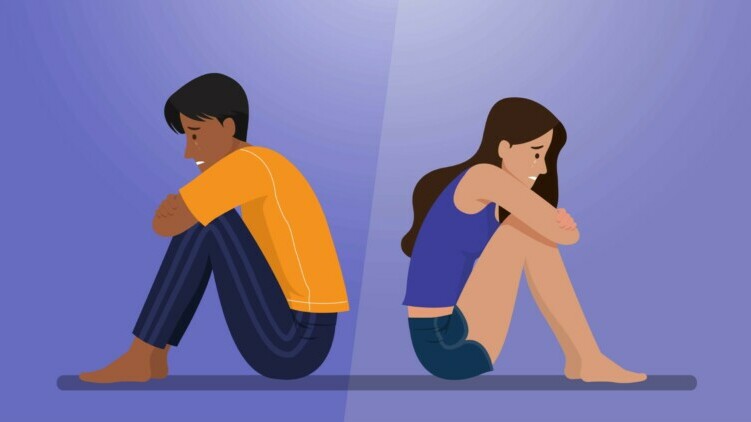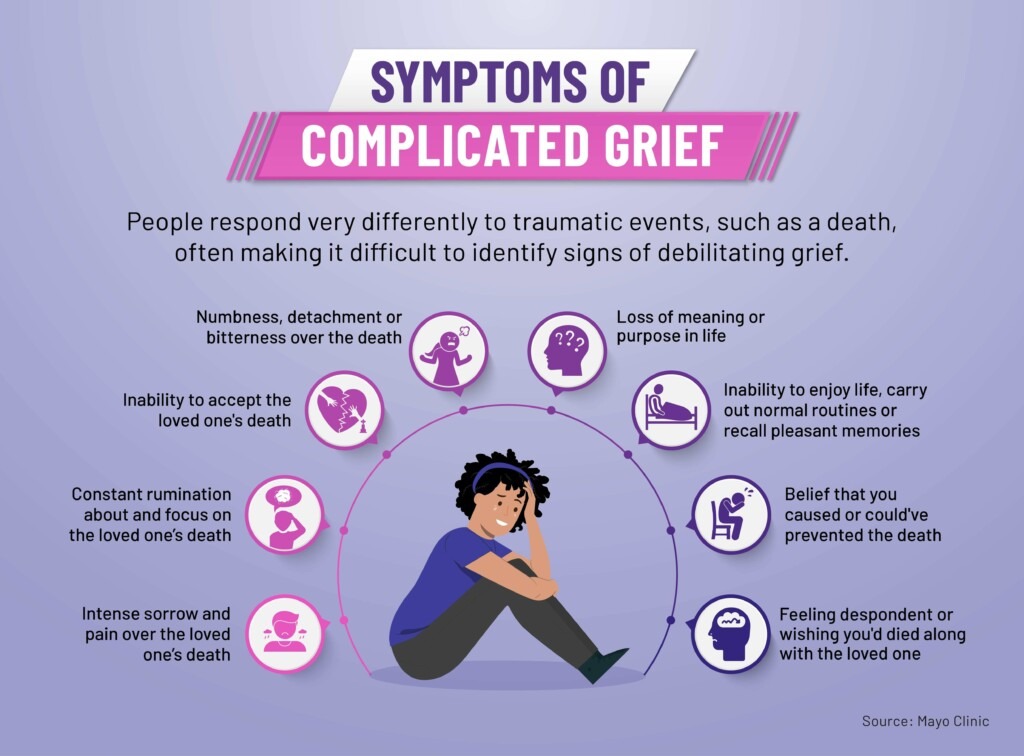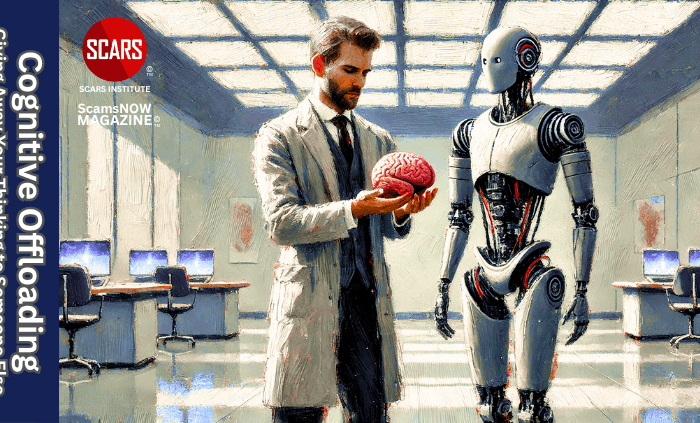PTSD and Complex Grief – What Are The Differences?
Authors:
• Vianey Gonzalez – Licensed Psychologist Specialty in Crime Victim Trauma Therapy, Neuropsychologist, Certified Deception Professional, Psychology Advisory Panel & Director of the Society of Citizens Against Relationship Scams Inc.
• Tim McGuinness, Ph.D. – Anthropologist, Scientist, Director of the Society of Citizens Against Relationship Scams Inc.
PTSD and Complex Grief/Complicated Grief: The Two Main Disorders That Often Confuse Scam Survivors And That Affect Scam Victims (Not Including Anxiety Or Depression)
These two main disorders are PTSD and Complex Grief. Scam victims can easily develop one or the other. It is often the case that victims tend to gravitate towards the label PTSD because it is better known, but may not be the right term for what they are experiencing.
This is why it is so important to have a professional therapist to help make these diagnoses.
What are PTSD & Complex Grief?
Post-Traumatic Stress Disorder (PTSD) and Complex Grief are two distinct psychological conditions, each with its own set of characteristics, manifestations, and treatment approaches.
Complex Grief is also known as complicated grief, and may be more common in scam victims than PTSD – though both appear to be widespread.
PTSD
Post-traumatic stress disorder (PTSD) is a mental health condition that can develop after a person has experienced or witnessed a traumatic event, such as a war, a natural disaster, a car accident, or a violent crime.
Symptoms of PTSD can include:
- Intrusive thoughts: Recurring, unwanted thoughts or images of the traumatic event.
- Nightmares: Vivid dreams about the traumatic event.
- Flashbacks: Feeling like the traumatic event is happening again.
- Avoidance: Avoiding people, places, or activities that remind the person of the traumatic event.
- Negative thoughts and feelings: Feeling negative emotions such as fear, anger, guilt, or shame.
- Hyperarousal: Feeling constantly on edge and irritable.
PTSD can have a significant impact on a person’s life. It can make it difficult to work, study, and maintain relationships. It can also lead to problems with sleep, substance abuse, and depression.
Complex Grief
Complex grief is a type of grief that is so severe and prolonged that it interferes with a person’s ability to function in their daily life. It can occur after the death of a loved one, but it can also be triggered by other losses, such as the loss of a job, a home, a pet, or in the case of romance scams.
Symptoms of complex grief can include:
- Intense longing and yearning for the deceased
- Difficulty accepting the reality of the loss
- Feelings of bitterness, anger, and resentment
- Guilt and shame
- Physical symptoms such as fatigue, pain, and difficulty sleeping
- Social isolation
- Difficulty concentrating and making decisions
Complex grief can have a significant impact on a person’s physical and mental health. It can also lead to problems with work, relationships, and social activities.
Breakdown of the Differences
Here’s a detailed breakdown of the differences between them and how they affect individuals:
Definitions and Main Causes:
- Basics:
- PTSD is a mental health condition triggered by exposure to a traumatic event. These events typically involve a real or perceived threat to one’s life or well-being, such as combat, natural disasters, accidents, or violence. PTSD can occur when the individual experiences or witnesses a traumatic event.
- Complex Grief, also known as Prolonged Grief Disorder or Complicated Grief, is a condition that arises from the loss of a loved one, such as a family member, friend, partner, or a romance scam. What sets it apart from regular grief is the persistence and intensity of the symptoms, lasting well beyond what is considered a normal mourning period.
- Manifestations and Identifiers:
- PTSD key identifiers of PTSD are often grouped into three categories: re-experiencing, arousal, and avoidance symptoms. PTSD can manifest in a variety of ways. Some people may experience all of the symptoms listed above, while others may only experience a few. The severity of symptoms can also vary from person to person. PTSD can be diagnosed by a mental health professional, such as a psychiatrist or psychologist. The professional will ask the person about their symptoms and experiences. They will also do a physical exam to rule out any other medical conditions that could be causing the symptoms.
- Re-experiencing: Individuals may suffer from flashbacks, nightmares, or distressing memories of the traumatic event.
- Arousal: This category includes symptoms like irritability, difficulty sleeping, and heightened responses to threats or triggers.
- Avoidance: People with PTSD might avoid reminders of the trauma, including conversations, places, and activities.
- Complex Grief often involves more pervasive and longer-lasting symptoms than regular grief. Complex grief can manifest in a variety of ways. Some people may experience all of the symptoms listed above, while others may only experience a few. The severity of symptoms can also vary from person to person. Complex grief can be difficult to identify, especially in the early stages of grief. However, if a person is still experiencing intense grief and difficulty functioning in their daily life more than six months after a loss, it is important to seek professional help.
- Intense Longing: A persistent yearning for the deceased person.
- Preoccupation: Excessive thoughts or even intrusive images related to the loss.
- Avoidance: Avoiding reminders of the deceased or situations that bring about painful memories.
- Identity Disruption: A significant change in one’s sense of self and future outlook.
- Difficulty Moving On: Inability to find meaning or purpose after the loss.
- PTSD key identifiers of PTSD are often grouped into three categories: re-experiencing, arousal, and avoidance symptoms. PTSD can manifest in a variety of ways. Some people may experience all of the symptoms listed above, while others may only experience a few. The severity of symptoms can also vary from person to person. PTSD can be diagnosed by a mental health professional, such as a psychiatrist or psychologist. The professional will ask the person about their symptoms and experiences. They will also do a physical exam to rule out any other medical conditions that could be causing the symptoms.
- Onset and Duration:
- Symptoms of PTSD typically begin within three months of the traumatic event. If untreated, they can persist for years, with some individuals experiencing chronic PTSD.
- Complex Grief symptoms of Complex Grief may not appear until six months after the loss. The condition can extend beyond the typical mourning period, lasting for several years in some cases.
- Treatment:
- Effective treatments for PTSD include:
- Therapies: PTSD can be treated with a variety of therapies, including:
- Cognitive-behavioral therapy (CBT): CBT helps people to identify and change the negative thoughts and behaviors that are associated with their PTSD.
- Exposure therapy: Exposure therapy involves gradually exposing people to the things they fear in a safe and controlled environment. This helps people to learn to manage their anxiety and to cope with their trauma.
- Eye movement desensitization and reprocessing (EMDR): EMDR is a therapy that uses eye movements to help people to process their trauma.
- Medications: Antidepressants and anti-anxiety medications can help manage symptoms.
- Lifestyle Changes: Strategies such as exercise, healthy eating, and adequate sleep can contribute to overall well-being.
- Therapies: PTSD can be treated with a variety of therapies, including:
- Complex Grief can be treated with a variety of therapies, including:
- Grief therapy or counseling: Grief therapy helps people to process their grief and to learn to cope with their loss. Specialized grief counseling can assist individuals in processing and accepting their loss.
- Cognitive-behavioral therapy (CBT): CBT helps people to identify and change the negative thoughts and behaviors that are associated with their grief.
- Cognitive Therapy: Similar to CBT, cognitive therapy aims to identify and change dysfunctional thought patterns related to the loss.
- Family therapy: Family therapy can be helpful for people who are grieving the loss of a loved one. It can help families to communicate and support each other during this difficult time.
- Support Groups: Participating in professionally facilitated support groups with others who have experienced similar losses can provide comfort and understanding.
- Medications: In some cases, antidepressants may be prescribed to help manage symptoms of depression and anxiety.
- Effective treatments for PTSD include:
- Prognosis:
- With appropriate treatment, many individuals with PTSD can experience significant improvements in their symptoms and overall quality of life. However, some may continue to experience mild symptoms or relapses.
- Complex Grief can be more challenging to treat and may require longer-term therapy. While many people eventually adjust to their loss, some may continue to experience significant distress.
Summary
PTSD and Complex Grief are distinct psychological conditions, each with its own triggers, symptoms, and treatment approaches. Understanding the differences between them is crucial for accurately identifying and addressing the needs of individuals who may be struggling with these conditions. If you or someone you know is experiencing symptoms related to either PTSD or Complex Grief, seeking professional help is a vital step toward recovery and healing.
If you or someone you know is struggling with PTSD or complex grief, it is important to seek professional help. With the right treatment, people can recover from these conditions and live full and productive lives.
More:
- Mental Compartmentalization And Recovery For Scam Victims 2023 (scamsnow.com)
- Motivational Denial (scamsnow.com)
- Secrets Can Be Deadly For Scam Victims – Scam Victim Recovery Psychology (scamsnow.com)
- Relationship Scams And Their Impact On Memory (scamsnow.com)
- Scam Victims And The Reactivity Loop (scamsnow.com)
- Scam Victim Suicides Are Up – New Data Hints (scamsnow.com)
- Scam Victims & Mental Health Blaming (scamsnow.com)
- Scam Victim Resiliency – Why It Is So Much Worse After The Scam (scamsnow.com)
- Dealing With Grief & Recovery During The Holidays (romancescamsnow.com)
- The Complicated Truth About Scam Victim Grief (romancescamsnow.com)
- Psychology Of Scams: A Candid Discussion Of Grief By Nora McInerny – TED Talk [Video] (romancescamsnow.com)
SCARS Resources:
- For New Victims of Relationship Scams newvictim.AgainstScams.org
- Subscribe to SCARS Newsletter newsletter.againstscams.org
- Sign up for SCARS professional support & recovery groups, visit support.AgainstScams.org
- Find competent trauma counselors or therapists, visit counseling.AgainstScams.org
- Become a SCARS Member and get free counseling benefits, visit membership.AgainstScams.org
- Report each and every crime, learn how to at reporting.AgainstScams.org
- Learn more about Scams & Scammers at RomanceScamsNOW.com and ScamsNOW.com
- Global Cyber Alliance ACT Cybersecurity Tool Website: Actionable Cybersecurity Tools (ACT) (globalcyberalliance.org)
- Self-Help Books for Scam Victims are at shop.AgainstScams.org
- Donate to SCARS and help us help others at donate.AgainstScams.org
- Worldwide Crisis Hotlines: International Suicide Hotlines – OpenCounseling : OpenCounseling
- Campaign To End Scam Victim Blaming – 2024 (scamsnow.com)
-/ 30 /-
What do you think about this?
Please share your thoughts in a comment below!
More ScamsNOW.com Articles
-/ 30 /-
What do you think about this?
Please share your thoughts in a comment above!
SCARS LINKS: AgainstScams.org RomanceScamsNOW.com ContraEstafas.org ScammerPhotos.com Anyscam.com ScamsNOW.com
reporting.AgainstScams.org support.AgainstScams.org membership.AgainstScams.org donate.AgainstScams.org shop.AgainstScams.org
youtube.AgainstScams.org linkedin.AgainstScams.org facebook.AgainstScams.org
ARTICLE RATING
TABLE OF CONTENTS
- PTSD and Complex Grief/Complicated Grief: The Two Main Disorders That Often Confuse Scam Survivors And That Affect Scam Victims (Not Including Anxiety Or Depression)
- What are PTSD & Complex Grief?
- Breakdown of the Differences
- Summary
- More:
- SCARS Resources:
- SCARS Institute™ ScamsNOW Magazine
Society of Citizens Against Relationship Scams Inc. [SCARS]
CATEGORIES
MOST POPULAR COMMENTED ARTICLES
POPULAR ARTICLES
U.S. & Canada Suicide Lifeline 988
![NavyLogo@4x-81[1]](https://scamsnow.com/wp-content/uploads/2025/04/NavyLogo@4x-811.png)
ARTICLE META
WHAT PEOPLE ARE TALKING ABOUT LATEST SITE COMMENTS
See Comments for this Article at the Bottom of the Page
on Scam Victims Use Work To Avoid Healing: “The last 6 years have been the most difficult of my life. The pandemic, having both parents in the hospital…” Jun 29, 18:38
on Entitlement Mentality And How Scam Victims Often Lose Their Path To Recovery – 2024: “Thank you for this discussion of entitlement. I can see from the descriptions listed that I have not felt entitlement.…” Jun 29, 18:22
on Samurai Wisdom and Rituals for Clearing the Mind After Scam Trauma – 2025 – [VIDEOS]: “A great guide on how to move forward in our recovery process with a calm mind, cleansed on an ongoing…” Jun 28, 07:34
on Delayed Gratification and Patience in Scam Victim Recovery – 2025 – [VIDEOS]: “We want to recover quickly and… we make new mistakes. How not to speed up the recovery process, how to…” Jun 28, 06:41
on The Unique Injury Of Betrayal Trauma On Scam Victims – 2024: “Primarily because you did not see it coming” Jun 27, 23:57
on Changes In A Scam Victim’s Life: “I really detest the way my trust in others has been affected by the scamming I went through. I used…” Jun 27, 14:47
on The Unique Injury Of Betrayal Trauma On Scam Victims – 2024: “Betrayal Trauma is the worst feeling ever. Why does it seem so much worse when a scammer does that to…” Jun 27, 14:34
on EMDR Therapy For Scam Victims’ Trauma – A Part Of The Recovery Process For Many – 2024: “Very comprehensive article explaining all aspects of EMDR. I’d only heard of it before and now I have a much…” Jun 26, 19:01
on Forgiving Yourself After Surviving a Romance or Investment Scam – 2025: “Thank you for this valuable article. Self-forgiveness was for me the biggest step that led to my recovery. That also…” Jun 26, 17:28
on Counseling And Your Native Language: “These points make perfect sense. I can’t imagine trying to express complex emotions in a second language. I realize many…” Jun 26, 16:05
on Thought-Terminating Cliches – How What You and Others Say Stops Critical Thinking and Recovery for Scam Victims – 2025: “I didn’t realize that these “innocent phrases” clichés ending thoughts, can have such effect / negative -inhibiting / on our…” Jun 26, 14:48
on Scam Victim Resistance In Support Groups Therapy Or Counseling Can Destroy Opportunities For Recovery – 2024: “Working with either a support group or therapist to me means a self commitment to actively participating in the therapy.…” Jun 24, 21:01
on ‘I Just Want To Forget It’ – Denial & Avoidance Are Natural But Will Not Help Scam Victims On Their Path To Recovery From Scams – 2024: “My financial loss, the shock and betrayal of the crime ending all combined to fray my nerves and spend hours…” Jun 24, 20:10
on You Hate Being Told What To Do? How Your Rebellious Mentality Can Sabotage Your Recovery – 2025: “I am a bit of a rebel, and the moment someone tells me to do something, worse, does it even…” Jun 24, 15:04
on You Hate Being Told What To Do? How Your Rebellious Mentality Can Sabotage Your Recovery – 2025: “You are very welcome” Jun 24, 03:01
on You Hate Being Told What To Do? How Your Rebellious Mentality Can Sabotage Your Recovery – 2025: “This is a great article, which makes perfect sense as to why anyone would resist the help offered to them.…” Jun 23, 20:01
on Scam Victims’ Responsibilities – 2021 [Updated 2025]: “Thank you for this article. As I continue my journey, I focus on the here and now and let the…” Jun 21, 16:26
on Scam Victims Avoid Or Escape The Aftermath Of Scams – How Denial And Distraction Avoid Confronting Reality – 2024: “In the earliest days after my crime I felt powerless, helpless and weak. I had been through so much in…” Jun 21, 14:46
on Problems and Opportunities – Thoughts on Psychological Reframing – 2025: “An article that really helped me look at the problems in my life from a different point of view and…” Jun 21, 14:42
Important Information for New Scam Victims
Please visit www.ScamVictimsSupport.org – a SCARS Website for New Scam Victims & Sextortion Victims
SCARS Institute now offers a free recovery program at www.SCARSeducation.org
Please visit www.ScamPsychology.org – to more fully understand the psychological concepts involved in scams and scam victim recovery
If you are looking for local trauma counselors, please visit counseling.AgainstScams.org
If you need to speak with someone now, you can dial 988 or find phone numbers for crisis hotlines all around the world here: www.opencounseling.com/suicide-hotlines
Statement About Victim Blaming
Some of our articles discuss various aspects of victims. This is both about better understanding victims (the science of victimology) and their behaviors and psychology. This helps us to educate victims/survivors about why these crimes happened and not to blame themselves, better develop recovery programs, and help victims avoid scams in the future. At times, this may sound like blaming the victim, but it does not blame scam victims; we are simply explaining the hows and whys of the experience victims have.
These articles, about the Psychology of Scams or Victim Psychology – meaning that all humans have psychological or cognitive characteristics in common that can either be exploited or work against us – help us all to understand the unique challenges victims face before, during, and after scams, fraud, or cybercrimes. These sometimes talk about some of the vulnerabilities the scammers exploit. Victims rarely have control of them or are even aware of them, until something like a scam happens, and then they can learn how their mind works and how to overcome these mechanisms.
Articles like these help victims and others understand these processes and how to help prevent them from being exploited again or to help them recover more easily by understanding their post-scam behaviors. Learn more about the Psychology of Scams at www.ScamPsychology.org
SCARS INSTITUTE RESOURCES:
If You Have Been Victimized By A Scam Or Cybercrime
♦ If you are a victim of scams, go to www.ScamVictimsSupport.org for real knowledge and help
♦ Enroll in SCARS Scam Survivor’s School now at www.SCARSeducation.org
♦ To report criminals, visit https://reporting.AgainstScams.org – we will NEVER give your data to money recovery companies like some do!
♦ Follow us and find our podcasts, webinars, and helpful videos on YouTube: https://www.youtube.com/@RomancescamsNowcom
♦ Learn about the Psychology of Scams at www.ScamPsychology.org
♦ Dig deeper into the reality of scams, fraud, and cybercrime at www.ScamsNOW.com and www.RomanceScamsNOW.com
♦ Scam Survivor’s Stories: www.ScamSurvivorStories.org
♦ For Scam Victim Advocates visit www.ScamVictimsAdvocates.org
♦ See more scammer photos on www.ScammerPhotos.com
You can also find the SCARS Institute on Facebook, Instagram, X, LinkedIn, and TruthSocial
Psychology Disclaimer:
All articles about psychology and the human brain on this website are for information & education only
The information provided in this and other SCARS articles are intended for educational and self-help purposes only and should not be construed as a substitute for professional therapy or counseling.
Note about Mindfulness: Mindfulness practices have the potential to create psychological distress for some individuals. Please consult a mental health professional or experienced meditation instructor for guidance should you encounter difficulties.
While any self-help techniques outlined herein may be beneficial for scam victims seeking to recover from their experience and move towards recovery, it is important to consult with a qualified mental health professional before initiating any course of action. Each individual’s experience and needs are unique, and what works for one person may not be suitable for another.
Additionally, any approach may not be appropriate for individuals with certain pre-existing mental health conditions or trauma histories. It is advisable to seek guidance from a licensed therapist or counselor who can provide personalized support, guidance, and treatment tailored to your specific needs.
If you are experiencing significant distress or emotional difficulties related to a scam or other traumatic event, please consult your doctor or mental health provider for appropriate care and support.
Also read our SCARS Institute Statement about Professional Care for Scam Victims – click here
If you are in crisis, feeling desperate, or in despair, please call 988 or your local crisis hotline.
More ScamsNOW.com Articles
A Question of Trust
At the SCARS Institute, we invite you to do your own research on the topics we speak about and publish. Our team investigates the subject being discussed, especially when it comes to understanding the scam victims-survivors’ experience. You can do Google searches, but in many cases, you will have to wade through scientific papers and studies. However, remember that biases and perspectives matter and influence the outcome. Regardless, we encourage you to explore these topics as thoroughly as you can for your own awareness.















![scars-institute[1]](https://scamsnow.com/wp-content/uploads/2025/04/scars-institute1.png)
![niprc1.png1_-150×1501-1[1]](https://scamsnow.com/wp-content/uploads/2025/04/niprc1.png1_-150x1501-11.webp)

Thank you for this article and the distinctions between PTSD and Complex Grief. It is something I will bring to the attention of my therapist. The question arises on whether I am experiencing both or parts of both. And if this could have made me more susceptible to the crime I experienced. Then it follows how this affects my recovery.